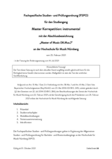for studies starting in winter semester 2021/22Subject-specific study and examination regulations (German)
The subject-specific study and examination regulations form the legal basis for your degree programme. They contain all the information you need to know about your studies, including module descriptions and how your grades are calculated.
-
Master Korrepetition: instrumental (2021)
Size:309 KB pdf
Professional field for which the degree programme qualifies
The Master's degree in Instrumental Accompaniment prepares students for a future career in which they will work primarily as an accompanist in a conservatory, opera house, music school or as a freelance pianist.
In addition to solo and chamber music concerts and teaching, accompaniment is another area of the pianist's professional life that offers a wide range of opportunities. Instrumentalists rely on accompanists to rehearse and perform their repertoire.
This places high demands on graduates in terms of both artistic ability and personality, as well as the ability to grasp quickly and in depth the requirements of a wide instrumental repertoire, to convey musical content and to help instrumentalists in all aspects.
